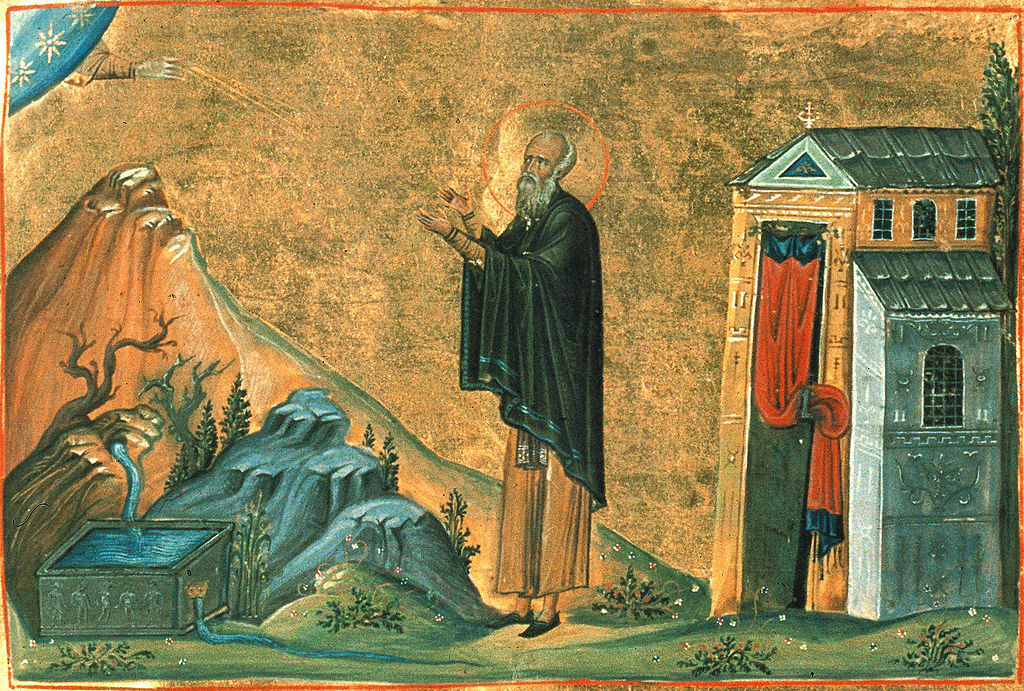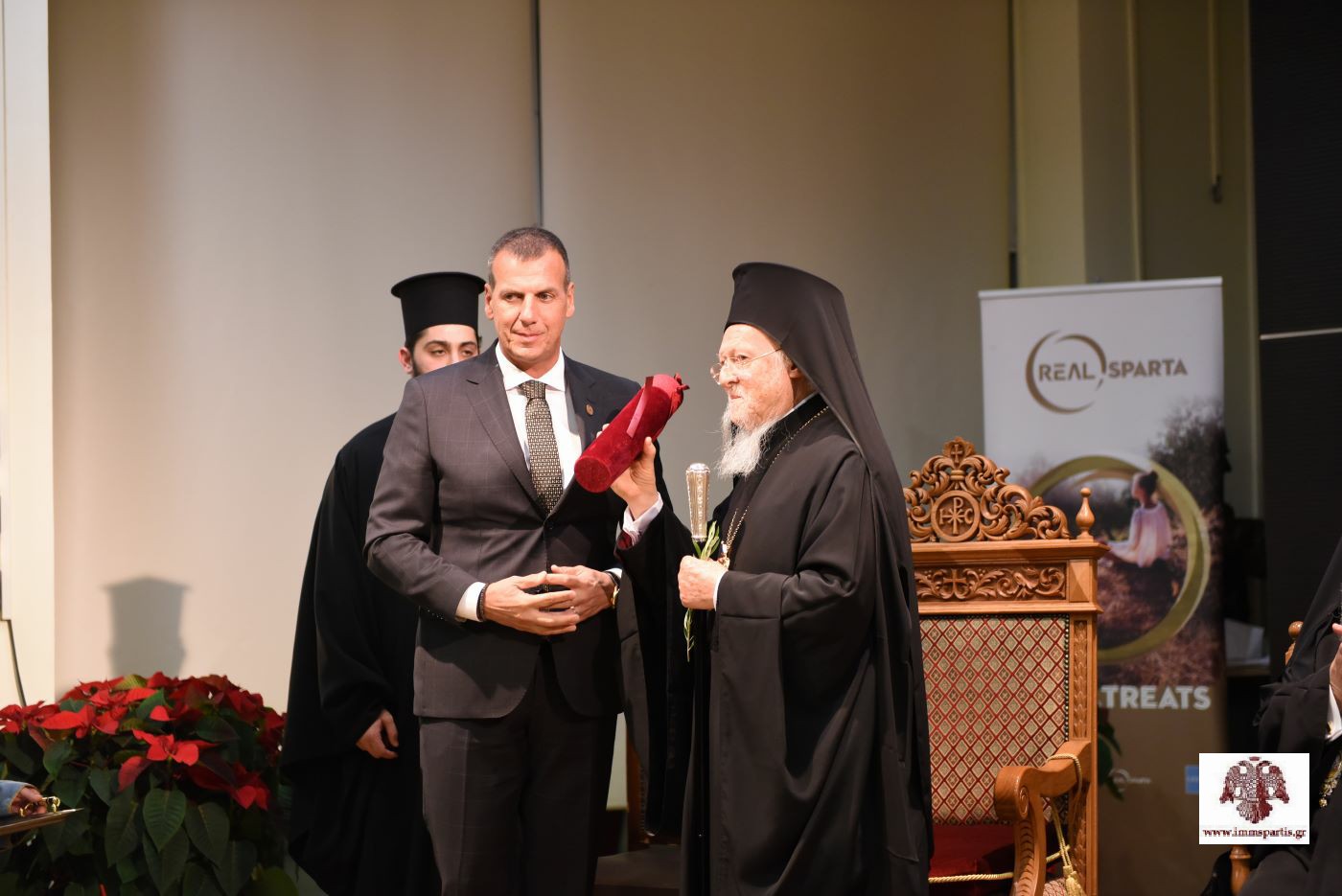Venerable Abramius the Recluse, and his niece, Blessed Mary, of Mesopotamia (29 October)


Saint Abramius the Hermit and Blessed Maria, his niece of Mesopotamia, lived the ascetic life in the village of Chidan, near the city of Edessa. They were contemporaries and fellow countrymen of Saint Ephraim the Syrian (January 28), who afterwards wrote about their life.
Saint Abramius began his difficult exploit of the solitary life in the prime of youth. He left his parents’ home and settled in a desolate wilderness place, far from worldly enticements, and he spent his days in unceasing prayer. After the death of his parents, the saint refused his inheritance and requested his relatives to give it away to the poor. By his strict ascetic life, fasting, and love for mankind, Abramius attracted to him many seeking after spiritual enlightenment, prayer and blessing.
Soon his faith was put to a serious test, as he was appointed presbyter in one of the pagan villages of Mesopotamia. For three years, and sparing no efforts, the saint toiled over the enlightenment of the pagans. He tore down a pagan temple and built a church. Humbly enduring derision and even beatings from obstinate idol-worshippers, he entreated the Lord, “Look down, O Master, upon Your servant, hear my prayer. Strengthen me and set Your servants free from diabolical snares, and grant them to know You, the one true God.” The zealous pastor was granted the happiness to see the culmination of his righteous efforts: the pagans came to believe in Jesus Christ, the Son of God, and Saint Abramius baptized them himself.
Having fulfilled his priestly duty, Abramius again withdrew into his wilderness, where he continued to glorify God and do His holy will. The devil, put to shame by the deeds of Saint Abramius, tried to entrap him with proud thoughts. Once at midnight, when Saint Abramius was at prayer in his cell, suddenly a light shone and a voice was heard, “Blessed are you, Abramius, for no other man has done my will as you have!” Confuting the wiles of the enemy, the saint said: “I am a sinful man, but I trust in the help and grace of my God. I do not fear you, and your illusions do not scare me.” Then he ordered the devil to depart, in the name of Jesus Christ.
Another time, the devil appeared before the saint in the form of a youth, lit a candle and began to sing Psalm 118/119, “Blessed are the blameless in the way, who walk in the law of the Lord.” Perceiving that this also was a demonic temptation, the Elder crossed himself and asked, “If you know that the blameless are blessed, then why trouble them?”
The temper answered, “I provoke them in order to conquer them and turn them away from every good deed.” To this the saint replied, “You gain victory over those who, like yourself, have fallen away from God. You are forced to vanish, like smoke in the wind, from before the face of those who love God.” After these words the devil vanished. Thus Saint Abramius defeated the Enemy, being strengthened by divine grace. After fifty years of ascetic life, he peacefully fell asleep in the Lord.
Saint Abramius’s niece, the Nun Maria, had grown up being edified by his spiritual instruction. Her father died when she was seven, and so she had been raised by her saintly uncle. But the Enemy of the race of man tried to turn her from the true path. At twenty-seven years of age she fell into sin with a man. Thoroughly ashamed, she left her cell, went to another city, and began living in a brothel. Two years later, when he had learned of this, Saint Abramius clad himself in soldier’s garb, so that he would not be recognized, and went to the city to find his niece. He pretended to be one of her “clients,” and revealed his identity once they were alone. With many tears and exhortations, he brought her to repentance and took her back to her cell.
Saint Maria returned to her cell and spent the rest of her days in prayer and tears of repentance. The Lord forgave her and even granted her the gift of healing the sick. She died five years after Saint Abramius.
Our Righteous Father Abramius, born in Edessa in Mesopotamia in 296, took up the monastic life and brought many pagans to Christ. Mary, his niece, upon the death of her parents, joined Abramius at his hermitage and under his guidance advanced swiftly in the love of God. Through the wiles of the evil one, however, she fell into sin, and falling from them into despair, she left her uncle and became a harlot. When he learned where his niece was, Abramius put on the clothes of a man of the world and went to visit her in disguise. Through his exhortations, Mary returned to her first hope in the mercy of God, was rescued from the life of harlotry, and ended her life in great holiness. He himself reposed in the year 366. Saints Abramius and Mary were friends of Saint Ephraim the Syrian, and it was he who wrote their account.
Forced to do so by his parents, he married, but on the very day of his wedding he left his bride, his parents’ home and all that he possessed, and withdrew into solitude to live a life of strict asceticism. He labored thus for fifty years, and left his cell only twice during that time. The first time, he left at the order of his bishop to convert a pagan village to the Christian Faith. The second time he came out to save his licentious niece Mary. He entered peacefully into rest in the year 360 A.D., at the age of seventy. (See “Reflection” below.)
Apolytikion of Abramius the Recluse
Plagal of the Fourth Tone
The image of God, was faithfully preserved in you, O Father. For you took up the Cross and followed Christ. By Your actions you taught us to look beyond the flesh for it passes, rather to be concerned about the soul which is immortal. Wherefore, O Holy Abramius, your soul rejoices with the angels.
Kontakion of Abramius the Recluse
Third Tone
Thou, while living in the flesh, * wast as an angel upon earth;* and through thine ascetic pains,* thou didst become like a great tree* planted by the streams of temp’rance,* increasing greatly;* with the rivers of thy tears, thou didst cleanse away stains. * O Abramius, for this cause, * a godly vessel* of the Good Spirit art thou.
Source: oca.org / goarch.org / westserbdio.org




